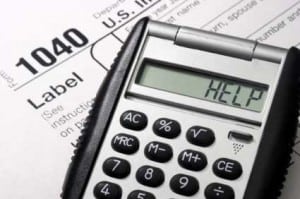Table of Contents
- Three Reasons to Consider Hiring a Tax Professional
- Tax Professional Reason Number 1: Your Situation Has Become More Complicated
- Tax Professional Reason Number 2: You Have Significant Events on the Horizon
- Tax Professional Reason Number 3: You want a Second Set of Eyes to Help You Understand Your Financial Picture
- Different Professional Tax Services and Types of Tax Professionals
- Non-Credentialed Tax Preparers
- Tax-Preparation Stores
- Should You Use an Independent Tax Firm?
- CPAs
- Enrolled Agents
- Tax Attorneys
- Questions to Ask a Tax Professional
- Conclusion
For a lot of military households, tax preparation is simple, straightforward and free. Every year, collect the paperwork and head down to the VITA (Volunteer Income Tax Assistance) office, and the staff can help you do your taxes. Or, if you’d rather do it on your own, you can either use a software provider such as TurboTax or go to the IRS FreeFile website.
However, you often get what you pay for. Over the course of your military career, you might find yourself in situations where the free offerings no longer make sense. You may want to consider hiring an accountant or other tax professional.
In this guide, we discuss the following tips:
- Three reasons to consider hiring a tax professional
- Different tax services and types of tax professionals
- Questions to ask a tax professional
- How to decide which tax pro to hire
Three Reasons to Consider Hiring a Tax Professional
Below are three situations in which you may want to hire a tax professional.
Tax Professional Reason Number 1: Your Situation Has Become More Complicated
Over the course of your military career, you can expect many things to progress. Rank, household size and income are three things that generally grow over the course of a 20+ year career.
With that progression comes a certain complexity, which comes at us a little at a time. Getting married, buying a home or having a child are all examples of the slow and steady way our lives become more complicated, especially in the case of a tough deployment, extended temporary duty travel or unexpected permanent change of station.
Then, at tax season, you expect to plug all this stuff into a tax-preparation program and get it 100% right.
If you’re improperly calculating taxes that you owe the IRS, don’t worry. They will make sure you pay the proper amount and remit what you owe (plus interest). They won’t be as helpful if they owe you money. If your situation has become complicated, you might want to have your taxes professionally done so you don’t leave money on the table.
Tax Professional Reason Number 2: You Have Significant Events on the Horizon
Financially significant events, such as selling some of your investments, liquidating retirement savings or retiring from the military, have tax implications. Some can be done in either a tax-efficient or -inefficient manner. Before doing anything, consider discussing your options with a tax professional or a fee-only financial planner so that you end up with as much after-tax money as possible.
If you’ll be incurring taxes in the process, you’ll want to accurately calculate your tax liability so you can budget for it, pay it and not have to worry about the IRS knocking on your door.
For example, many service members who buy a home either sell it or rent it out due to PCS. Once that house becomes a rental, you’ll have to calculate Section 1250 depreciation, which is deductible against rental income but recaptured when you sell it. When you sell your rental, calculating your tax liability by yourself is a tedious, confusing task. When selling that rental, you should always hire a tax professional to ensure that you have the correct tax liability calculation.
Other major circumstances in which you may want to consider hiring a professional include:
- Working with trust assets (such as an inheritance)
- When you’re managing other people’s property and money (such as dealing with elder care)
- Working with people who have special needs
- Having a business (even if it’s a sole proprietorship)
- Selling or liquidating assets (such as retirement accounts, 529 plans or after-tax investments)
Tax Professional Reason Number 3: You want a Second Set of Eyes to Help You Understand Your Financial Picture
Perhaps you’re doing well on your own. You might feel that your situation doesn’t warrant assistance and that you’ve got a handle on your entitlements.
However, you might have a little doubt in the back of your head: Am I doing this right? But how do I know? It might not hurt to have a second opinion. If you do, one of two things will happen:
- You’ll be right. If that’s the case, then you’ve bought yourself some peace of mind. Even then, you might pick up a piece of tax advice based on your situation.
- You’ll be wrong. If you’re wrong, here’s your chance to either save some money or save some peace of mind with the IRS. You can also go back (up to three years) to see if filing an amended return is in order. The odds are, you won’t be completely off. However, tax calculations are complicated enough so that even one adjustment or one new piece of information will change an entire tax return. Having a professional set of eyes looking at your finances could mean a huge difference.
Different Professional Tax Services and Types of Tax Professionals

Now that you’ve decided to ask for some help with your taxes, who do you turn to? We’ll take a look at the different types of services and professionals available to help you make your decision.
Non-Credentialed Tax Preparers
A non-credentialed tax preparer hasn’t undergone certification through the IRS or other third-party. That means pretty much anyone can hang up a sign and call themselves a tax preparer, so always get recommendations before working with one, and ask if they have been issued an Annual Filing Season Program Record of Completion by the IRS. This demonstrates that they have completed a set number of continuing education hours for the tax year. Some non-credentialed tax preparers may receive training and work with an organization or program, such as a Volunteer Income Tax Assistance or Tax Counseling for the Elderly program or a national tax franchise.
Tax-Preparation Stores
Many people use the services of tax-preparation stores, especially for simpler tax returns. They employ tax preparers, who may or may not be credentialed. Tax preparers for the national franchises, such as H&R Block and Jackson Hewitt, do undergo a training process.
Should You Use an Independent Tax Firm?
Independent tax firms are locally owned accounting businesses that work with individuals and companies. They usually have accountants on staff with a range of tax specialization and experience. If you have a fairly complex tax situation, a local firm may be your best option. In my experience, independent firms can get to know your individual needs and offer a high level of consulting and customer service.
CPAs
If your income tax situation is more complex, you may want to hire a certified public accountant. While anyone can call themselves a tax preparer, CPAs are state-licensed by the state and highly regulated. They must pass a rigorous exam and complete ongoing professional development or continuing education credits. Most states also require CPAs to pass an ethics exam. While a CPA will cost more than a non-credentialed tax preparer, they can help you with any issues that come up, including audits and appeals. Not all CPAs specialize in taxes and tax preparation. Learn more at the Association of International Certified Public Accountants website.
Enrolled Agents
Enrolled agents are licensed by the IRS after rigorous testing or experience working at the IRS. To maintain their status, which is the highest credential the IRS offers, enrolled agents must complete an additional 72 hours of continuing education every three years and must adhere to professional standards. EAs can prepare taxes and represent you or your business with any IRS matter. Learn more at the National Association of Enrolled Agents website.
Tax Attorneys
Tax attorneys are licensed to practice law by the state in which they work. They must first have a law degree and pass the bar exam. In addition, most states require that they stay up-to-date through continuing education. They have extensive knowledge of tax laws. While tax lawyers can assist you in completing your business or individual tax return, they are usually retained for complicated tax situations or to represent their clients with the IRS.
Questions to Ask a Tax Professional
Before you retain a tax professional, get recommendations from others.
Here is some additional information you’ll want to gather from the tax professional:
- Find out who will be preparing your tax return and how much experience they have. Do they have any credentials or licenses?
- How long the firm has been preparing income tax returns
- If you have a more complicated return, such as one including rental properties or a small business, ask if the firm and/or tax preparer has experience in these types of returns.
- Ask how fees work and what the expected turn-around time is.Find out what their policy is about making amendments to your form if they are needed in the future?
- You also want to ask what services the firm or the individual will provide to help if there is a problem with the IRS.
- Find out what they need from you. To effectively prepare your taxes and ensure you claim all the tax credits and deductions you are entitled to, a tax professional should be asking you a lot of questions as well.
If you aren’t satisfied with the answers you receive or aren’t comfortable with the tax preparer, look for someone else. The fee you pay for professional tax help usually depends on the complexity of your return. Some professionals charge by the number of tax forms you require, some charge by the hour and some bill a flat fee.
Here are some red flags to watch out for:
- A firm or individual wants to charge you based on how much refund you’ll receive.
- You are asked to sign a blank tax return form.
- They recommend that your tax refund be sent somewhere besides directly to your bank account.
- They promise an immediate tax refund — this tax refund schedule should give you a decent idea of when to expect tax refunds.
Check Up on the Tax Preparer
Before you actually hire a tax preparer, check on any licenses or other credentials they claim to have. You can also search for any disciplinary actions taken against CPAs, enrolled agents or attorneys. Here are some places to begin your search:
- Your state’s board of accountancy can help you ensure a CPA is currently certified. You may also be able to find any disciplinary actions.
- You can find disciplinary actions against tax professionals on the IRS website.
- The National Lawyer Regulatory Bank, maintained by the American Bar Association, has a directory of lawyer disciplinary agencies by state.
Conclusion
You probably know that you have until April 15 to file taxes most years (unless you qualify for a tax extension from a deployment or other situation). In 2023, the deadline is April 18 due to the observance of Emancipation Day. If you haven’t started, now’s the time to begin gathering your information and deciding who’s going to do your taxes.
Most people are able to do their own taxes and carry on with their lives. However, the more complexity your life has, the more complicated your tax situation becomes. Eventually, you may reach the point where hiring a tax professional can be worth more than the cost of their services.
Just remember that, regardless of who completes your tax return, you are responsible for its accuracy.




Comments:
About the comments on this site:
These responses are not provided or commissioned by the bank advertiser. Responses have not been reviewed, approved or otherwise endorsed by the bank advertiser. It is not the bank advertiser’s responsibility to ensure all posts and/or questions are answered.
Shammy Peterson says
It made sense to me when you said that you must consider doing a background check to ensure that you will hire a licensed tax preparer. My uncle will surely consider this tip because he needs the help of a tax preparer. He is leaving the country for a few months, and he needs to find a trusted professional before his flight. http://www.houghcpa.com/taxservices.html
Dr. Timothy Lawler says
Great article with a wealth of information. During this time of tax prep season, I think it is smart to hire someone eventually, but most people don’t even attempt to do their taxes themselves. Therefore, they don’t even try to go throught the educational process. I say try it yourself first, and then if they become too horrible or scary, then go to the professional. Of course, this advice is for the “average Joe”, not someone who owns a business of any type. Thanks again Laura. Keep the good stuff coming!
Pat S. says
I’ve always had fairly simple returns. I think if you get to the point where you are confused, making mistakes, or missing out on money that you are eligible for, or if you have experienced a big life change, it may be in your best interest to hire a pro.